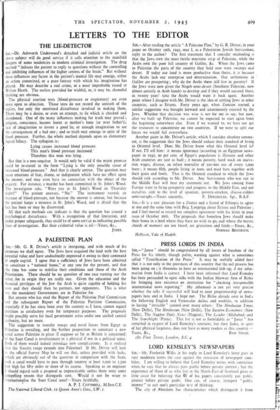LETTERS TO THE EDITOR
THE LIE-DETECTOR
Sta,—Dr. Ashworth Underwood's detached and judicial article on the above subject will do. good service if it calls attention to the manifold dangers of some tendencies in modern criminal investigation. The drug method "induces the patient to reply to questions without the controlling and inhibiting influences of the higher centres of the brain." But without those influences any factor in the patient's mental life may emerge, either an action committed, or a pure fantasy with which his imagination has played. He may describe a real crime, or a most improbable round at Walton Heath. The outlets provided for wishful, or, it may be, shameful thinking are obvious.
The physical reaction tests (blood-pressure or respiratory) are even more open to objection. Those tests do not record the untruth of the replies, but only the emotional disturbance involved in making them. There may be a desire, or even an attempt, to lie which is checked and abandoned. One of the many influences making for truth may prevail ; religion, conscience, lessons learnt at mother's knee (or over father's), lack of imagination to invent a good lie, or enough imagination to see the consequences of a bad one ; and so truth may emerge in spite of the blood pressure. Further, the whole method depends upon an elementary logical fallacy. The syllogism is: Lying causes increased blood pressure.
This man's blood pressure increased.'
Therefore this man was lying.
But that is a non-sequitur. It would only be valid if the major premise could be re-stated in the form " Lying is the only possible cause of increased blood-pressure." And that is clearly untrue. The question may cause emotions of fear, shame, or indignation which have no effect upon the answer, and may even have no connection with the object of the enquiry. For instance, a murder has been committed in St. John's Wood. The investigator asks, " Were you in St. John's Wood on Thursday night?" The patient answers, " No." The instrument records an increase of blood-pressure, not because the answer is untrue, but because the patient keeps a mistress in St. John's Wood, and is afraid that the fact has been or may be discovered.
All that such methods can indicate is that the question has caused a psychological disturbance. With a recognition of that limitation, and under proper safeguards, they could be of some service as indicating possible lines of investigation. But their evidential value is nil.—Yours, &c., Junax.






























 Previous page
Previous page